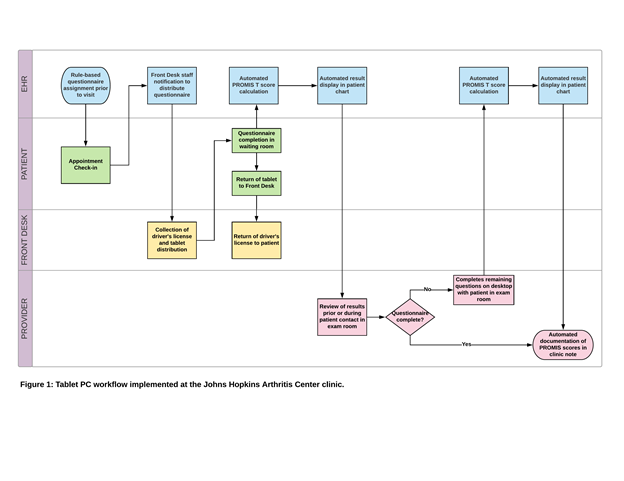Session Information
Session Type: ACR Poster Session A
Session Time: 9:00AM-11:00AM
Background/Purpose: Assessment of patient-reported outcomes (PROs) at clinic visits has emerged as an important component to determine disease activity in Rheumatoid Arthritis (RA). However, paper-based distribution, scoring and documentation on PROs is time-consuming and prone to human error. Modern electronic health record (EHR) systems allow for automatic integration of PRO data captured on tablets in the waiting room. Distribution, scoring, analysis and documentation of PRO questionnaires can be automated, thereby increasing the time a provider can spend with each patient. Methods: A paper-based RA questionnaire containing components of PROMIS profiles was transformed into an electronic version within the Epic EHR system (Figure 1). Questionnaires were assigned automatically at clinic visit using rule-based logic and completed on Windows tablets. Automated calculation of PROMIS T scores was programmed into Epic according to the PROMIS manual. Average time to complete the questionnaire and percentage of completed PROMIS domains were calculated. Smart links were built to allow the automatic integration of the results into the clinic note. A specific alert was programmed to notify providers in case of severe depression as determined by the PROMIS depression T score equivalent to the PHQ-9 definition using PROsetta stone. Results: 297 questionnaires were delivered to consecutive outpatients seen at the Johns Hopkins Arthritis Center. The median time to complete 55 questions was 8 minutes 15 seconds (9 seconds per question). Median time increased with age and was highest in the group of 71-80 years of age, at 10 minutes 46 seconds. The completion rate for individual PROMIS domains ranged between 94.6% and 97.6%.A severe depression alert was triggered in 8/297 patients (2.7%). Aggregated PROMIS domain T scores were successfully extracted from the EHR system (table 1). Conclusion: Electronic delivery of PRO questionnaires on tablets in the clinic waiting room is feasible and well accepted by patients with arthritis. This workflow leads to a high completion rate of PRO questionnaires and decreases provider workload with regards to scoring and documentation time. Application of rule-based logic allows for a tailored assignment of PRO questionnaires to specific patient populations.
|
T score (lower is better) |
≤50 |
50-≤55 |
55-≤60 |
60-≤65 |
65-≤70 |
>70 |
|
Fatigue (n=289) |
28.7(%) |
18.0(%) |
15.6(%) |
15.6(%) |
13.5(%) |
8.7(%) |
|
Pain Interference (n=290) |
20.7 |
10.3 |
25.5 |
20.0 |
16.9 |
6.6 |
|
Sleep (n= 281) |
34.9 |
28.1 |
22.1 |
7.1 |
4.3 |
3.6 |
|
Anxiety (n=284) |
40.8 |
15.1 |
15.8 |
11.3 |
10.9 |
6.0 |
|
Depression (n=286) |
49.7 |
9.4 |
18.9 |
13.6 |
5.6 |
2.8 |
|
|
|
|
|
|
|
|
|
T score (higher is better) |
≥50 |
45-<50 |
40-<45 |
35-<40 |
30<35 |
<30 |
|
Physical Function (n=285) |
20.4(%) |
16.1(%) |
22.1(%) |
17.2(%) |
17.9(%) |
6.3(%) |
|
Ability To Participate (n= 289) |
38.4 |
18.3 |
19.0 |
13.8 |
5.5 |
4.8 |
Table 1: Distribution of PROMIS domain T scores of patients evaluated at the Johns Hopkins Arthritis Center using tablet PCs for PRO collection.
To cite this abstract in AMA style:
Grader-Beck T, Jones M, Orbai AM, Bingham III CO. Electronic Delivery of Patient-Reported Outcome Questionnaires on Tablet PCs at Clinic Visit: A Feasibility Study [abstract]. Arthritis Rheumatol. 2018; 70 (suppl 9). https://acrabstracts.org/abstract/electronic-delivery-of-patient-reported-outcome-questionnaires-on-tablet-pcs-at-clinic-visit-a-feasibility-study/. Accessed .« Back to 2018 ACR/ARHP Annual Meeting
ACR Meeting Abstracts - https://acrabstracts.org/abstract/electronic-delivery-of-patient-reported-outcome-questionnaires-on-tablet-pcs-at-clinic-visit-a-feasibility-study/

